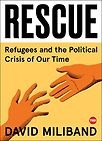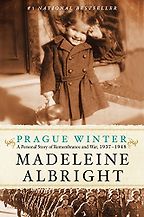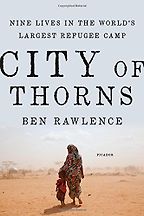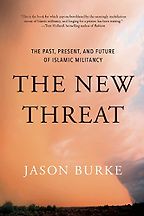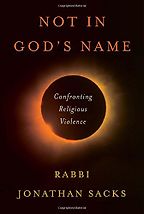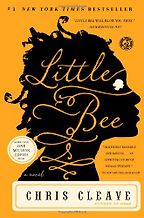As President of the International Rescue Committee you oversee humanitarian relief and resettlement operations for refugees. Record numbers of people are displaced around the world. Can you please outline the daunting dimension of the contemporary crisis?
Last year there were twenty million refugees and forty million people displaced within their own countries, as a result of violence—that’s sixty million people, in sum. One in every 122 of the global population is displaced by conflict. Perhaps most strikingly, only one percent of the world’s refugees went home last year. This is a problem that’s growing, as wars in Afghanistan, Somalia, Syria, South Sudan and elsewhere mutate and elongate. So the dimensions of this problem are large.
And the complexity is growing. The average duration of displacement is now seventeen years. Further, the focus of displacement is now urban areas; sixty percent of refugees are now in urban areas – not in refugee camps. And of course, increasing numbers of people who are internally displaced are under the [control] of armed opposition groups, notably in Syria and Iraq, but also you have the threat of Boko Haram in Nigeria and Niger. So this is not just a growing problem but an increasingly complex one.
You are the son of refugees; please tell us about your personal connection to this work.
My dad was a refugee from Belgium in 1940. He came to the UK with his dad at sixteen. He got his matriculation, went to the London School of Economics for a year and then spent three years in the UK Royal Navy. My mum lost her father in the war, but survived the war herself in Poland. She came to the UK as a young girl in 1946. So, in a small way, I’m repaying the debt that my family owes to those who helped my parents.
How does your parents’ plight, the stories you must have heard as a child, inspire or inform your work at IRC.
The stories of my parent’s generation were the background music to my childhood. They weren’t pushed down my throat, they were there in the background. I think it would be wrong to over claim for their influence.
Whenever people ask me why I took the job at IRC, I say that the challenges of delivering humanitarian aid in war situations are some of the biggest challenges in public policy. I say that the IRC has enormous potential to be an operational and thought leader. And I say that my own personal story gives me a connection to the work. I don’t dwell on it, but it is part of the answer.
The first of the five books you’ve selected is a memoir by a refugee, a rather famous one. Tell us about Secretary Madeleine Albright’s Prague Winter?
Madeleine Albright has an extraordinary story but she also tells an extraordinary story, which is that when she was Secretary of State she officiated at a citizenship ceremony for refugees and a woman came up to her afterwards and said, ‘Isn’t it amazing that someone with my background can come to America and be sworn in as a citizen by the Secretary of State?’ And Madeleine Albright replied by saying, ‘It’s even more remarkable that the Secretary of State who is swearing you in is herself a refugee.’
This book tells the core of Madeleine’s story. She didn’t know her own Jewish background until the 1990s. She fled from Czechoslovakia in the 1930s and the 1940s with her family. So it’s a human story.
“Albert Einstein, who founded the IRC, was a refugee to the US. Andy Grove, who founded Intel, was a refugee to the US. Sergey Brin, the co-founder of Google, was a refugee to the US.”
But I have a second reason for choosing it. Refugees are often talked of as a burden. Madeleine’s story shows that refugees don’t just become patriotic citizens, they become incredibly productive ones as well. Albert Einstein, who founded the IRC, was a refugee to the US. Andy Grove, who founded Intel, was a refugee to the US. Sergey Brin, the co-founder of Google, was a refugee to the US. Refugees who come here know the value of this country. Madeleine’s book tells that story.
Like Madeleine Albright, you were Foreign Secretary. How does having helmed the foreign affairs of the UK inform your work?
It helps me see both ends of the telescope. If you’re in foreign policy, you’re looking at statistics, you’re looking at problems from a long way away. In the humanitarian sector, in the NGO sector, you’re at the other end of the telescope. You’re trying to make the world better one life at a time. I think it’s helpful to be able to see things from both perspectives. There is a temptation to just say politics is one box and humanitarian affairs is another box. It is certainly true to say there are humanitarian principles—such as neutrality and impartiality—that don’t belong in politics. But it does help to see the bigger picture. And, of course, politics and the humanitarian effort intersect, both locally and internationally.
Can you think of any specific instance in which your work as Foreign Secretary helped you to tackle a challenge at IRC?
I think it’s important to be able to take the granular aspects of the humanitarian project and take it to a policy stage. For instance, I gave a speech at Georgetown University focused on what we need to achieve at the World Humanitarian Summit, which was called for by the UN Secretary General for the 23rd of May, and how that feeds into the World Summit in September on Refugees and Migration. So, my experience allows me to speak to public policy issues in a way that is timely and useful.
City of Thorns by human rights researcher Ben Rawlence, is your next recommendation. Tell us about it.
This is a book about the world’s largest refugee camp, Dadaab. It’s a camp of about 350,000 people in eastern Kenya, full of Somali refugees. It’s been there for thirty years. It’s a tale of nine visits to the camp. Although most refugees are in urban areas, long-term refugee status is often associated with refugee camps. This is the world’s largest one and it shows the problems. The camp, which is set up for a short-term respite, when it becomes a long-term city, has massive problems associated with it. It shows the economy, the insecurity, the hopelessness, the cruelty, the kindness that arises when you put 350,000 people together.
It also describes some of the relationships between the camp dwellers and Kenyan society. The last Kenyan election, in some ways, focused on what to do with Somali refugees. The book takes in those bigger political questions, which exist in Western societies as well as developing countries, and balances them with the real day-to-day struggle for survival in refugee camps.
You often speak about the complexity of current humanitarian needs and how the ‘humanitarian sector’s’ service delivery model is too camp-based. Please explain.
Since most refugees live in urban areas, they are not a captive audience for social services, for health services for educational services. And so the challenges are finding people, sheltering them, stopping them from being abused (there is abuse in refugee camps but there are different people preying on them).
There is an obvious potential upside, which is that in urban areas there is a chance for refugees to become economically independent, if the local laws allow them to work. So that’s the essential issue.
Shifting to the roots of the contemporary crisis, let’s discuss the third title on your list, The New Threat from Islamic Militancy. Please tell us about this book, by British journalist Jason Burke.
Jason Burke is one of the best. He’s a journalist but he’s also a scholar. He’s spent an enormous amount of time in Afghanistan, in Pakistan, in the Middle East. He gets his feet dirty.
This book is a historical look at Islamic militancy. It’s wrong to describe the current scale of displacement that people are enduring without mentioning the fact that the convulsions within some parts of the Islamic world are central to the refugee statistics as they are today. It is striking that the IRC was founded by Einstein to rescue Jews from Europe and today forty percent of our work is in Muslim-majority countries: Syria, Afghanistan, Pakistan etc. One can’t ignore this part of the story.
Equally, as some of the politics in America shows at the moment, it’s easy to get it wrong. That’s why it’s very important that people understand the deep roots of some of the convulsions that are taking place at the moment. Burke weaves together the history of militancy in the twentieth century, the significance of 1979, and the roots of the current conflict in Syria and elsewhere.
You’ve called the current crisis on Europe’s shores the product of “a decade of disorder.”
What I said is that we’re entering ‘a decade of disorder.’ The international system is weaker and more divided than in a generation or longer. While the Cold War was a period of organized division, now we’re in a period of disorganized fragmentation. People talk about a leaderless world; I don’t buy that. But I think it is a period of fragmentation around the world. All countries are turning inwards, not just the United States. The management of the global commons is a global tragedy, whether in security, health, education or the environment.
Next, you’ve named a response to religious extremism from the former Chief Rabbi of the Commonwealth. Tell us about Not in God’s Name, by Rabbi Jonathan Sacks. Please tell us about it.
This is an extraordinary book. From a religious perspective, it confronts, head-on, the responsibilities of religions for violence. The central thread is that religion can warm and religion can burn. Jonathan Sacks explains the roots of this dual identity of religion, its ability to unite, its ability to separate. He looks at the three Abrahamic faiths and tries to diagnose why they have been such a source of conflict and what can be done about it. It’s an extremely erudite book. I’m not a religious person myself, so it was an education for me, but it’s also quite inspiring.
What can individuals do to stem religious militancy and the refugee crises it causes?
The essential answer to that question can sound prosaic—it’s to reach out. The essential story of human society is that where people build things together they form fellow feeling. And where they Balkanize, where they separate, they bring about misunderstanding and division.
“It is striking that the IRC was founded by Einstein to rescue Jews from Europe and today forty percent of our work is in Muslim-majority countries: Syria, Afghanistan, Pakistan.”
Today, when you think about the West, the most integrated cities are, in general, the most respectful and tolerant of difference. Proximity to people who are different doesn’t produce dissent, it actually produces ‘live and let live.’ One of the most striking parts of Sacks’s book is where he says the most challenging injunction in the Bible is not to love your neighbor, it is to love a stranger. The point is that where people live, work and play together they understand each other and they respect each other.
Little Bee by Chris Cleave is the final book on your list. Tell us about this work of fiction.
It’s a remarkable book by a British author who spoke at an IRC event a couple years ago. It’s about ‘Little Bee,’ a Nigerian refugee. The opening page says, “Britain is proud of providing a safe haven for people fleeting [sic] persecution and conflict.” That’s from Life in the United Kingdom: A Journey to Citizenship, UK Home Office 2005, a guide given to those preparing for the citizenship exam. The book is about the relationship between two women, Little Bee and Sarah, a mother who becomes a widow. These characters come to live together when Little Bee presents herself at Sarah’s house for shelter, having been released from a UK refugee detention center. It’s a laugh-and-cry, not just dry, non-fiction.
Does the book’s depiction of dehumanizing detention centers ring true? How can IRC and we help humanize the way refugees are treated?
The book doesn’t dwell on the detention center point. But what is well-conveyed is the chaos as well as the dehumanization of detention centers. The people in the centers have such shattered lives that it’s almost like fragments of glass thrown together. There are people from Jamaica, people from Nigeria, people from Afghanistan, all in the same place. And it conveys a sense of how bureaucracy can lose sight of the human condition.
Get the weekly Five Books newsletter
We are a large international organization. We work in thirty war-torn countries as well as in twenty-six US cities, resettling refugees. We’re a 700 million dollar organization but we retain a human scale in the work that we do and the relationships we have with our partners.
This is a book about resettlement, the aim of every refugee and one of IRC’s primary goals. Tell me about this part of Little Bee and IRC’s story.
We are unique in that we are both an international humanitarian organization, which is the vast bulk of our work, but we’ve also resettled ten thousand refugees across the US. We meet them at the airport, we organize their housing, we get their kids in school, and we help the adults get a job. For the Syrian refugees we work with, eighty percent of households have someone in work within six months of arriving. Our work allows us to see the full arc of crisis, from the displacement right through to the resettlement. Resettlement is about one-eighth of our work, but it provides a unity to our work.
Does dealing with these acute international policy dilemmas, from your perch at IRC, ever make you yearn for the relative simplicity and tractability of domestic politics?
Yearning is the first step toward disappointment, so I try to avoid that.
Are the challenges you face at IRC more maddening then those you’ve faced previously?
In government you’ve got a lot of power and a lot of obstacles. In the NGO sector you’ve got much less power but fewer obstacles. So it’s different. Cruelty, stupidity, bureaucracy and shortsightedness are always maddening, whether you’re in government or in the NGO sector. The point is to try to overcome them.
YOU CAN MAKE A DONATION TO THE IRC HERE
Interview by Eve Gerber
May 25, 2016. Updated: March 23, 2022
Five Books aims to keep its book recommendations and interviews up to date. If you are the interviewee and would like to update your choice of books (or even just what you say about them) please email us at [email protected]
Five Books interviews are expensive to produce. If you've enjoyed this interview, please support us by donating a small amount.

